11 Blackjack Mistakes You Should Stop Making
By Daniel Grant
Updated 26 Nov, 2025

Blackjack tables are a showground for a wide range of blackjack mistakes. But not all blackjack mistakes are equal. There are countless ways to misplay your hand, but the worst blackjack blunders aren’t confined to playing strategy. From care-free attitudes to the rules, to chasing losses and not knowing when to quit, there are no shortage of common errors which hurt your chances of winning.
I’m about to reveal the 11 deadly sins committed by both beginners and experienced players. You’ll learn what they’re doing wrong, how it affects the end result and what you can do to avoid making the same blackjack mistakes.
If you fancy listening to me talk about this topic instead of reading this page, here’s the OJO Show podcast episode about blackjack mistakes:
#1 Settling for bad table rules
“I don’t care what the house edge is, I just want to play”
Every blackjack table uses a set of rules which determine the house edge. Different combinations of blackjack rules are used at tables across the real and virtual worlds, and the range of house edges is surprising. Most players ignore the price they pay to play, and simply want the nearest and quickest game. This is the most common of blackjack mistakes and hurts your bottom line before you’ve played a hand.
Even once they’ve sat down, some players fail to familiarise themselves with the rules, which makes it very difficult to know how to play solid blackjack. Some get a nasty surprise when they’re told they can’t double on 8, or split more than once.
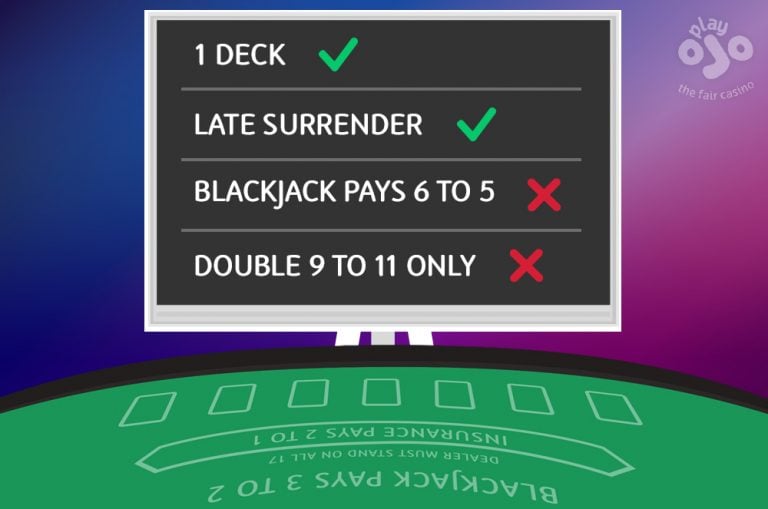
You may not always have a selection of tables with varying rules to choose from. If you’re playing in a small land-based casino, they will probably only have a handful of blackjack tables which all use the same rules.
But if you play blackjack online, or in Vegas where you have hundreds of tables within 1 square mile, there’s no excuse for accepting rules with a bigger house edge (unless you like a particular rule). When you play online, you can even check the RTP for each game, so there is REALLY no excuse!
As a general rule, you should never accept payout odds for Blackjack of less than 3 to 2. Look for tables with rules which benefit the player (e.g. surrender, double on any 2 cards, split Aces more than once, dealer stands on Soft 17) and avoid tables where the blackjack rules seem to help the dealer (dealer hits on Soft 17) or where your options are limited (no resplitting of pairs).
#2 Not following basic strategy
“Blackjack is easy, I don’t need to know how to play”
Following the advice in blackjack strategy charts is the number #1 rule of blackjack. Ignoring it is the most expensive mistake any player can make (aside from playing a game which pays 6 to 5 on blackjack!).
If a set of rules exists that’s easy to learn and enables you to play perfectly, it’s crazy to ignore it. Following a blackjack strategy guide instead of making your own mind up may seem like hard work, but blackjack basic strategy is there to keep you on track for that all-important RTP, and stop casinos from winning more than they deserve.
Although it may take a little time and practice, learning basic strategy is a must if you want to learn how to win at blackjack and get the advertised house edge.
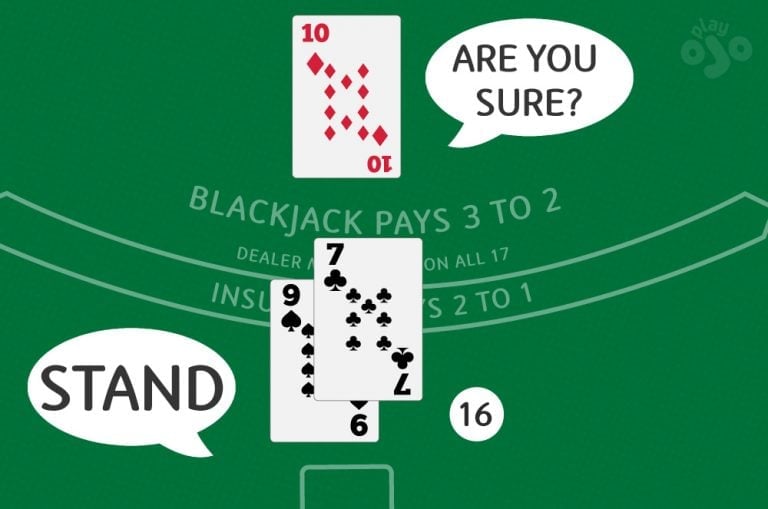
#3 Standing on 16 when you should hit
Most of the top 10 blackjack strategy mistakes involve being either too conservative (a fear of going bust or of having to double your stake) or too greedy (splitting a valuable pair or doubling when you should stand).
The fear of busting is often the powerful reason why some players stand on hands like 15 or 16. They know they’ll bust most of the time if they take another card. What these players don’t realise is that the dealer will make 17+ most of the time too, so your 16 won’t be good enough. You have to accept the risk of busting for the chance to improve your hand.
#4 Saying no to a double when it’s profitable
You won’t be a favourite to win every hand, so when that chance comes along in the form of an opportunity to double down, you have to press your advantage. In the case of hands like 10 or 11, you should double whenever the dealer has an up card that’s lower than your hand value.
In psychological terms, it’s easy to double on 11 against a dealer’s 6, but not against a dealer’s 10. But the expert advice, backed by computer simulations, says you will make a profit in the long run by doubling. Provided you’re following sensible bankroll management, you should go ahead and double down.
#5 Splitting tens
Splitting a pair of Tens is a common blackjack mistake players make when the dealer has a weak card. Instead of standing on 20, as a big favourite in the hand, players will split their pair, hoping to create two sets of 20 instead.
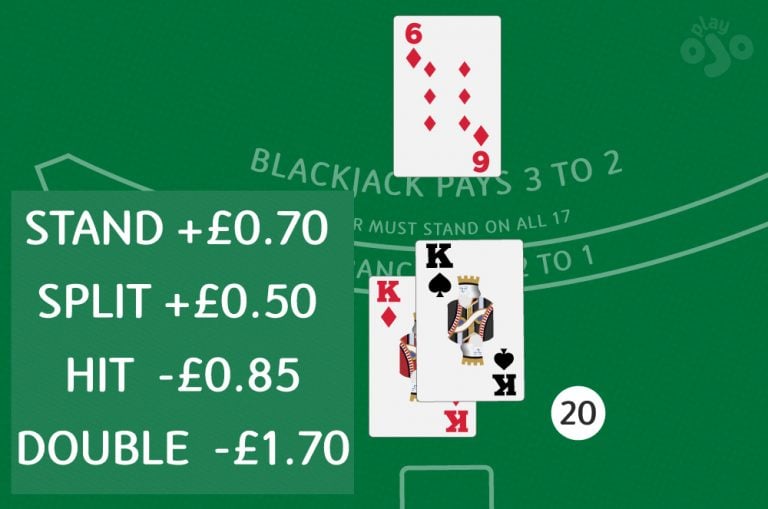
#6 Always taking insurance
“Insurance? Yes please! That dealer is lucky, she always makes Blackjack”
Let’s be clear, insurance in blackjack isn’t there to be your safety net. Despite its name and apparent purpose, insurance is a separate side bet on whether the dealer’s second card will be a 10, if their first was an Ace. With a house edge of over 7%, Insurance is much worse value than the game of blackjack itself.
It’s debatable whether always taking insurance is one of the top 10 blackjack mistakes. Which blackjack games you choose to play and the blackjack side bets you make are entirely your decision.
However I recommend you at least know how insurance works and the maths behind it, so you can bet with your eyes open.
#7 Chasing your losses
“I’ll just keep doubling my bet until I win a hand. It won’t be long.”
Not all common blackjack mistakes are about basic strategy. How much to bet can be a bigger banana skin than how to play your hand.
After a string of losing blackjack games, many players feel like they are due a win. They increase their bet size to win back the chips they lost. But in a game of coin flips where you will lose roughly 49% of the time, a run of 10 consecutive losses is far from impossible.
If you’re using a betting strategy based on chasing your losses, you’ll need a huge bankroll. Worse still, the casino sets a table maximum to prevent players using this betting model. At some point you’ll reach the table maximum and your system will be crushed.
Trying to win back your losses is also a sign that things are getting out of hand. Safer Gambling means controlling how much you bet, and how long you play. Sticking to a budget and a sensible betting strategy will ensure you keep blackjack fun.
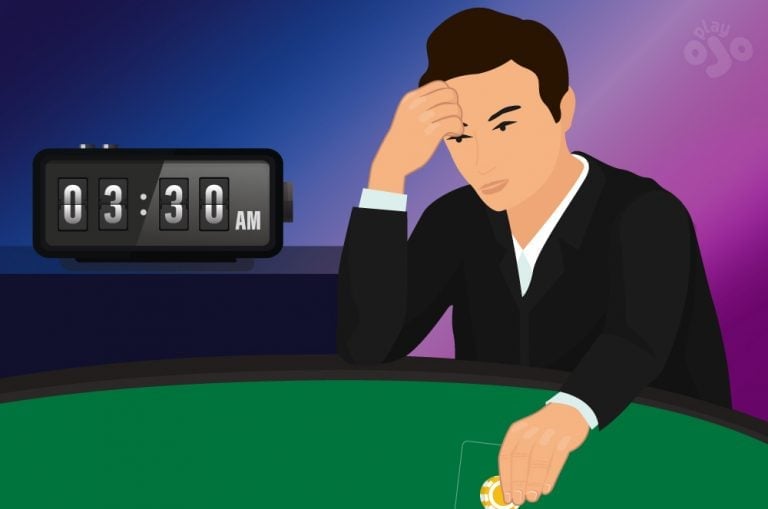
#8 Playing for too long
“I’m pooped, can’t concentrate. I’ll leave once I’ve hit my next Blackjack.”
Playing skillful blackjack requires concentration and sometimes a good memory. Unless you’re a pro who can play perfect strategy on autopilot, you’ll need to recall the correct move and make sensible decisions about your bet size along the way.
It’s common for players to play for long periods without leaving the table. The mental strain takes its toll and makes it extremely unlikely that they can focus on the correct strategy. Lack of focus means mistakes creep in.
Few players come out ahead when they play for too long, and not knowing when to stop can also a sign of problem gambling.
By playing in short bursts or setting yourself a time limit, you’ll avoid one of the most common online blackjack mistakes and improve your chances of sticking to your game plan.
Remember, there’s always another game. Your battle with the dealer lasts a lifetime, not a single session. Any blackjack game is just one page in a much larger book.
#9 Second guessing with hindsight
“I shouldn’t have hit. If I had stood, the dealer would have bust!”
If there are other players at the table when you play blackjack, you get to see their cards and usually the dealer’s cards too. Once they see all of the cards, players often realise they could have won if they or another player had played their hand differently.
This creates the opportunity for ‘what ifs’ where players second-guess their own decisions or disagree with another player’s decision. This kind of hindsight is incredibly common at live blackjack tables, but it does no one any good. You won’t get better at blackjack, or enjoy it more, by replaying the hand in your head once you’ve seen all the cards come out.
You couldn’t see the future when you made your decision, and there’s no point wishing you could change the past.
Good basic strategy is all about making the right mathematical move, whatever the outcome. On any single hand, you can play perfect blackjack and still lose. You can play terrible blackjack and still win, too. But in the long run, making the best decisions pays off.
Second guessing can also have an unfortunate effect on the table. Imagine a player says “if only Seat 1 had taken a card, the dealer would have bust”. This hindsight lets players to be grumpy about the outcome. They can blame other players for their loss, and it can be contagious.
Look after your own hand, let other players do as they wish and choose never to play ‘what if’. If you don’t like playing at tables with other players play different to you, simply choose a private online blackjack table, or play at quieter times.
#10 Misunderstanding how luck works
“How can the dealer’s 6 beat my 20 twice in a row? That’s impossible!”
Everyone knows there is luck in games of chance, even with a skill game like blackjack. But few understand how much luck there is, or its various effects. If you don’t understand luck – or variance as it’s sometimes called – then emotions can run wild. If you treat like 20 as a sure thing, you’ll be fuming when it loses.
But lose it will, and often too! You can be an 80% favourite and feel hard done by when the dealer wins. But if the maths says you’ll lose 1 in 5 times, you must accept and be ready for it to happen.
Luck creates strange stories. A hand may play out in a surprising way (the dealer’s 6 makes 21, to beat your KK). Or you might see a sequence of losses (or wins!) that seem impossible. But in a game with an element of luck, all of these events are actually certain to happen eventually. You can’t always have good luck, and without luck, there would be no game. Embrace it!
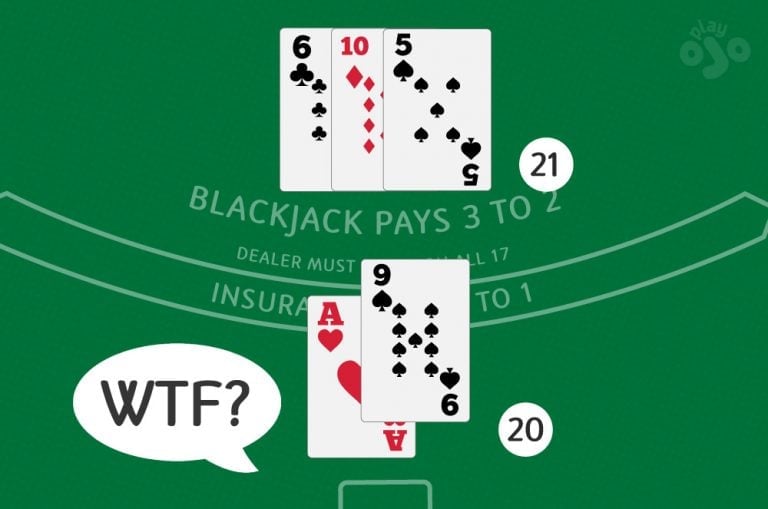
It’s common for players to complain about their bad luck. Some might suspect foul play, accuse the casino of cheating or blame the dealer. All of which prevents them from focusing on, and enjoying the game.
To paraphrase Kipling, if you can take wins and losses just the same, you’ll be doing great. If you can keep your head while all around you are losing theirs, you’ll be a better gambler than them!
Learn to the maths and the variance that make the game so unpredictable and fun. You’ll have a better chance of staying zen when you lose. You’ll be more likely to play perfect blackjack 100% of the time. And most important of all, you’ll enjoy the ride! The skills you get from combining knowledge with a balanced view of the game will serve you will in life, too.
#11 – Counting cards badly
“Low cards galore! I’m betting big!”
They say a little knowledge is dangerous. That’s never truer than at the blackjack table. Bad card counting may not be as big an issue as the other common mistakes I’ve revealed, but even social players sometimes hope that their attempt at ‘card counting lite’ will pay off.
You don’t need to know how to count cards or read best-selling book Beat The Dealer to know that a deck full of Tens is good for you. When the dealer deals a table of low cards, some players increase their bet size, feeling like they’re being smart.
Unless they’ve learned to count cards properly and mastered it in a real casino situation, they’re just as likely to be betting big when the deck is unfavourable to them! Counting cards isn’t something you can dip into profitably, or do by guesstimate. If you can’t keep an extremely accurate true count, it’s wise to leave it to the pros.
Conclusion
How many of those mistakes do you make? Some are easy to fix right away, while others may take a bit of time, or some extra learning. My best advice for playing error-free blackjack is to learn all you can about blackjack strategy, as incorrect strategy is the cause of most mistakes at the table.
Blackjack is a game of luck and the outcome of any individual hand is random. Any information or advice on this page is provided for informational purposes and will not improve your odds of winning any individual hand of blackjack.
Related Posts

Daniel Grant
About the Author
Dan Grant is a 25-year veteran of the gaming industry and a leading authority on iGaming content with over 1,000 articles on topics such as industry trends and bankroll strategy. He began in sports betting in 1997, then spent 11 years at a leading poker brand. As a content lead for iGaming marketing agencies, Dan has worked with over 30 regulated gaming brands, including giants like IGT. He also has a Law degree, providing a unique perspective on the regulatory complexities of the gaming market.
FAQs
Do blackjack dealers make mistakes in blackjack?
Dealers who have only just graduated from croupier college are the most likely to make common blackjack mistakes in the heat of the action. Assuming they are genuine, random errors, blackjack dealer mistakes can work in favour of the house or the player. Croupiers can misdeal the cards and cause the hand to be declared dead. It’s not uncommon for new dealers to miscalculate the value of a player’s hand and pay out winnings on a losing hand, or take your chips when you haven’t lost.
Dealers can also misread a player’s intention. They might stand when you wanted to hit, or deal you a card you didn’t want. When it comes to paying out winnings, dealers can accidentally pay out more or less by using the wrong denomination of chips. I’ve even heard of a dealer paying out a Blackjack immediately (as they should do) and then pay out again when the game is over!Dealers can also inadvertently expose the next card before its dealt, giving one lucky player the chance to bet bigger or smaller, depending on its value.
When you see common blackjack mistakes from a dealer, especially if it is not in your favour, speak up immediately and ask the pit bosses to help out. The chances are, it’ll be resolved on the spot.If that’s not possible or there is still a disagreement, the casino will check the camera footage while the game continues and inform you of the outcome as soon as they can definitively prove what happened.
What is the worst mistake in blackjack?
Although things like standing on 16 instead of hitting, and hitting instead of doubling down are common mistakes, the decision which increases the house edge most is actually choosing to take insurance. Insurance is a side bet with a much higher house edge than blackjack itself, and taking insurance every time the dealer has an Ace is probably the worst mistake in blackjack. Knowing when to take insurance in blackjack can be helpful, but as a general rule, if you are looking to keep the house edge as low as possible, it is better to focus on playing the main hand according to blackjack strategy rules, rather than getting involved in side bets. In games where the surrender rule is allowed, surrendering on anything but 16 against a dealer’s Ace or 10 is also considered by some to be a pretty bad mistake.
What is the most common mistake in blackjack?
There’s no data on the kinds of mistake that players make at the table, but from my experience, choosing to stand on 16 because you are more concerned about busting than hitting a hand that could win, is the mistake I have seen most often in my 20 or so years of playing blackjack in UK casinos. Another mistakes I have seen often, though not quite as much, is standing on soft hands when the blackjack strategy chart says you should hit. Soft 17 in blackjack is a tricky hand to play, so it pays to study the ‘soft hands’ section of blackjack charts to know the right way to play against different dealer upcards.
Availability depends on your country
















We use both automated and manual processes in order to verify the age of the customer registering the account and any player under the age of 18 who registers an account will have their account closed immediately.
We say NO to Underage Gambling . We do not allow players under the age of 18 to gamble. This is stated in our Terms and Conditions.
Trademark ™ 2025 PlayOJO. All rights reserved.
Apple and the Apple logo are trademarks of Apple Inc., registered in the U.S. and other countries. App Store is a service mark of Apple Inc., registered in the U.S. and other countries.
